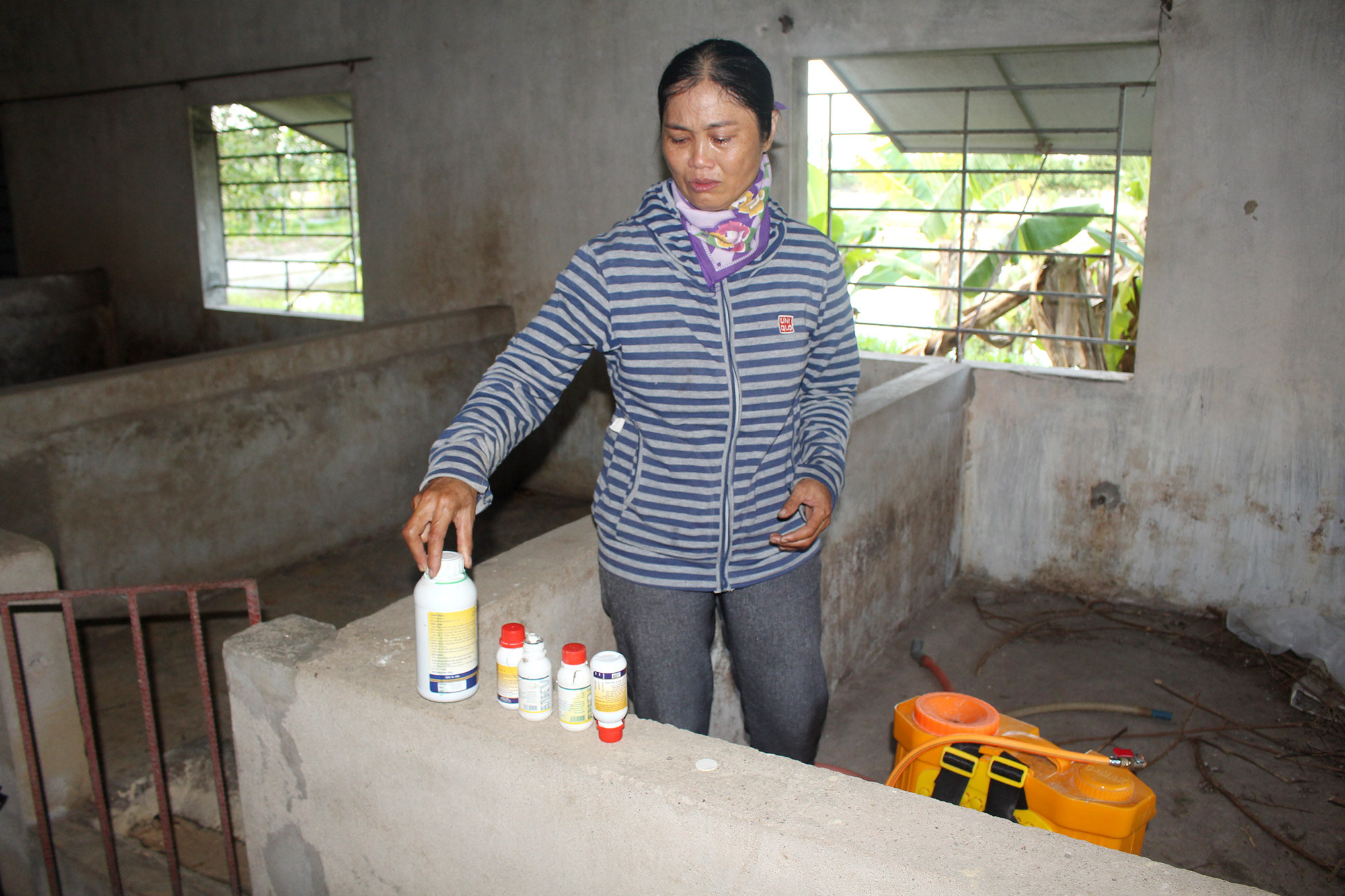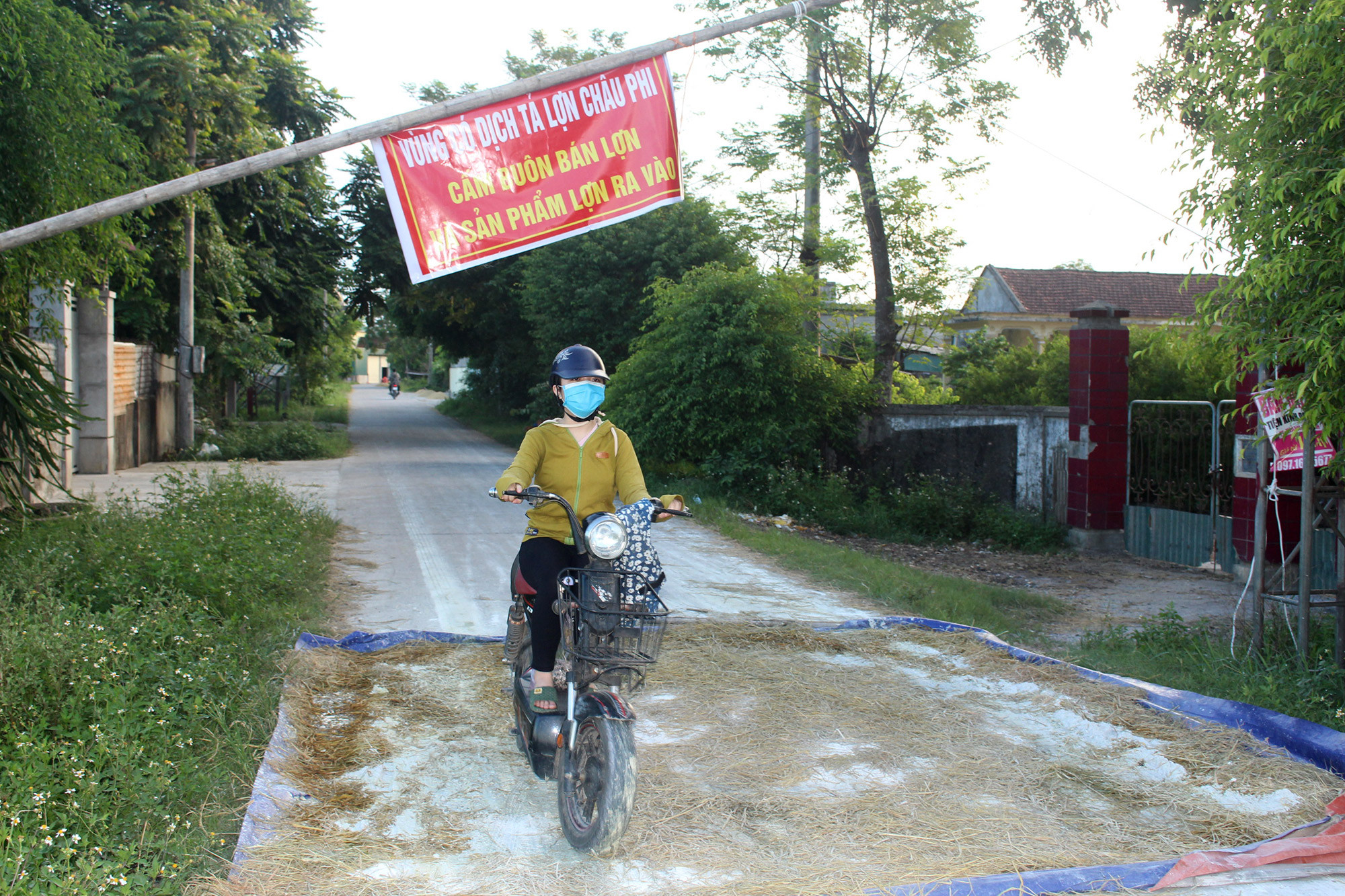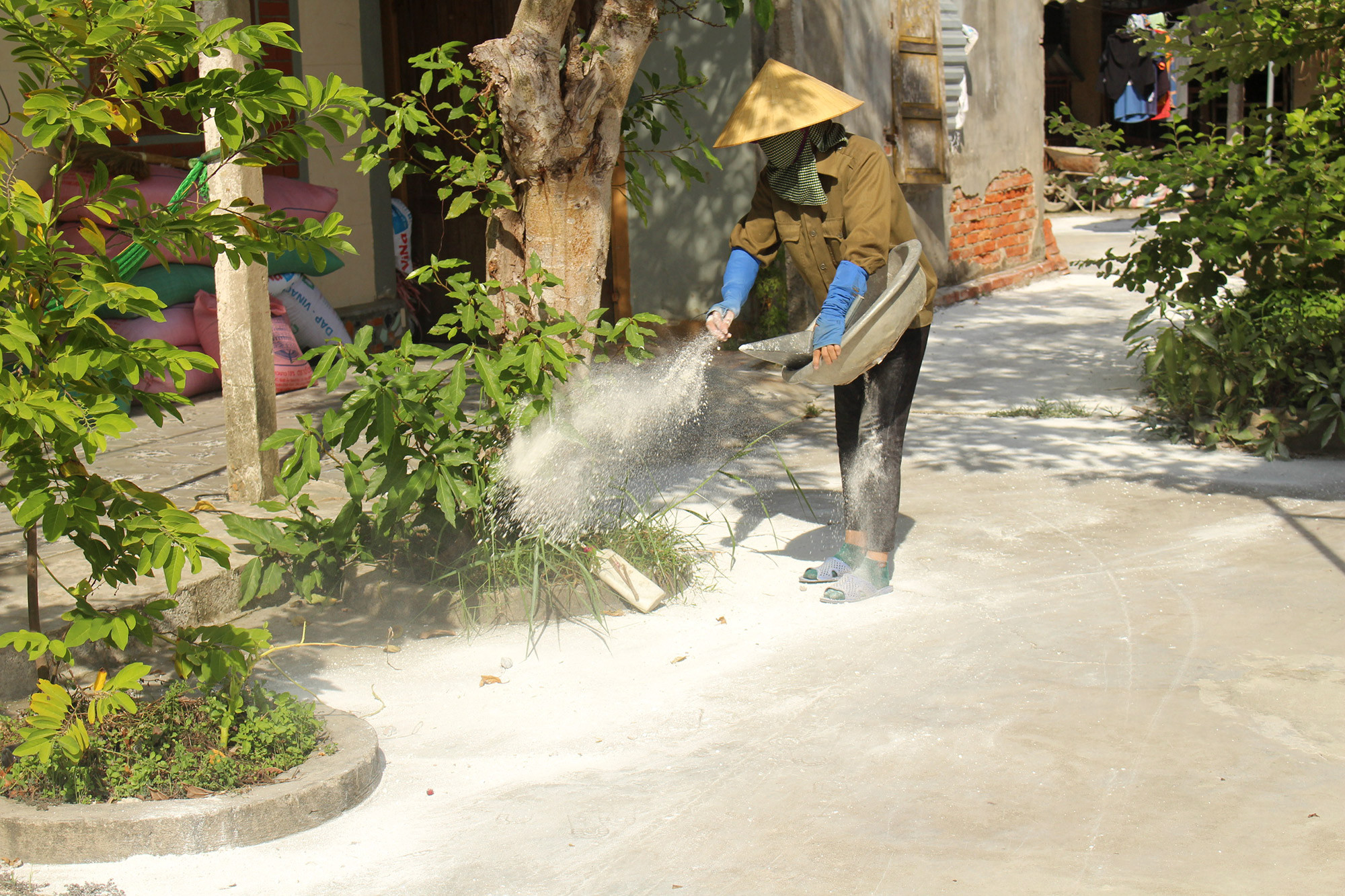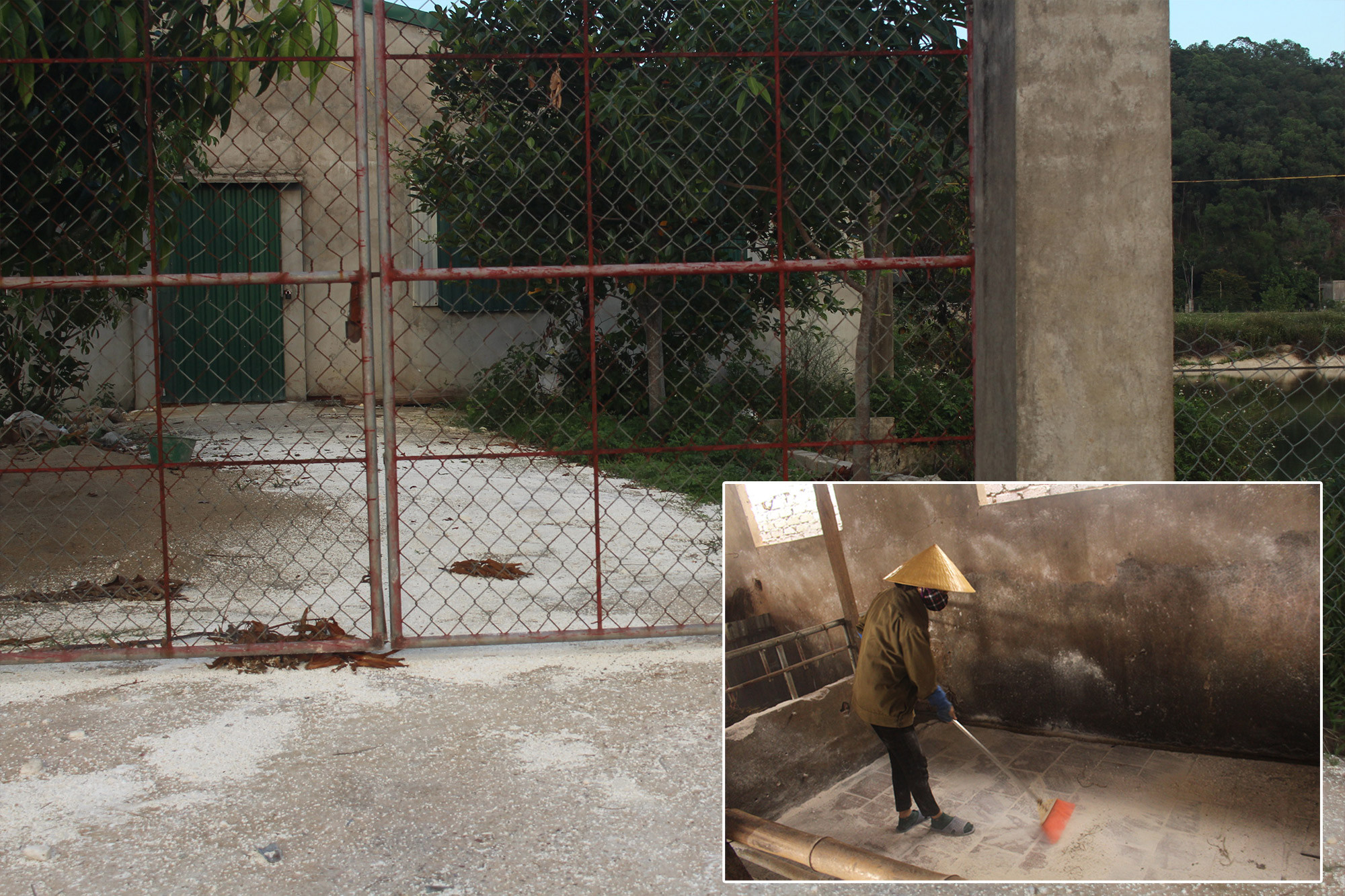African swine fever outbreak alarm in Nghe An
(Baonghean.vn) - Since the end of August, after a period of lull, African swine fever (ASF) has recurred in pig herds in many localities in the province.
Risk of widespread resurgence
Standing in a barn with no pigs left, Ms. Nguyen Thi Ha in Hamlet 2, Hung Nghia Commune (Hung Nguyen) said: After the empty barn due to African swine fever (ASF) in September 2019, her family had to destroy 60 pigs weighing from 20 to 70 kg, seeing that the situation had stabilized, in early August, Ms. Ha bought 12 pigs in the hamlet, including a sow about to give birth, for a total of 37 million VND.
After raising the pigs for a month, on September 7, the first pig got sick and stopped eating. Mrs. Ha bought medicine herself to inject the pigs, but they still died. After Mrs. Ha reported to the commune, samples were taken for testing and the results showed that they were sick.DTLCPforced to destroy
 |
| Mrs. Ha hesitates in the empty barn. Photo: Phu Huong |
Mr. Nguyen Van De - Vice Chairman of Hung Nghia Commune People's Committee said: Currently, 5 households in hamlets 2 and 3 have pigs infected with the disease, the pigs of 2 other households in hamlet 2 are waiting for results. The commune has assigned members of the anti-epidemic steering committee to direct the epidemic prevention in hamlets, mobilizing people in the whole commune to buy chemicals and lime powder to disinfect and sterilize around the barns, entrances and exits.
“However, epidemic prevention and control work is very difficult due to thefarmand households are all adjacent to each other, using the same water channel, so the disease is very easy to spread, the traffic is high; funding to support people in disease prevention and control is limited, the commune only disinfects and sterilizes public walkways, the rest people have to take care of themselves" - Vice Chairman of Hung Nghia Commune People's Committee added.
 |
| Quarantine checkpoint in the Hung Nghia epidemic area (Hung Nguyen). Photo: Phu Huong |
In Nghi Loc, at this time, the barn that originally had 1 mother pig and 4 piglets of Ms. Nguyen Thi Phuc's family in Nghi Thuan commune is also empty due to ASF.
In 2019, Nghi Thuan commune's pig herd suffered from 2 outbreaks of ASF, the first one at 2 households and the second one at over 90 households with sick pigs. "Nghi Thuan commune currently has nearly 400 pigs. The disease has only occurred in 1 household, but the people have handled, cured and destroyed the pigs themselves, so besides checking whether the destruction is safe, we are focusing on directing and guiding households in the commune to buy chemicals and lime powder to treat the environment, limiting the spread of pathogens" - Ms. Nguyen Thi Sen, an agricultural officer of Nghi Thuan commune said.
Proactively contain the epidemic in a narrow area
Nghe An has a large area, harsh climate all year round, large herds of livestock and poultry but mainly small-scale farming. From the end of August 2020 to now, ASF has occurred in 16 farming households in the districts of Hung Nguyen, Yen Thanh, Nam Dan, Ky Son, Nghi Loc, and Que Phong.
According to Mr. Ngo Duc Quynh - Deputy Head of the Provincial Department of Animal Husbandry and Veterinary Medicine, the current seasonal weather changes, reducing the resistance of livestock, creating favorable conditions for pathogens to survive and spread widely, with a high risk of disease outbreaks. Disinfection and detoxification work is not carried out regularly and continuously to destroy pathogens in the environment, and the vaccination rate for pigs is low, reducing resistance and immunity.
Meanwhile, transportation activities,slaughter, the trade of pigs and pork products has not been strictly controlled, people are hasty in arbitrarily re-herding without ensuring biosafety conditions; disease surveillance at the grassroots level is not proactive due to a lack of veterinary staff at the commune level...
 |
| People of Nghi Thuan commune (Nghi Loc) sprinkle lime to disinfect and sterilize entrances and exits. Photo: Phu Huong |
In the long term, the province is developing and promulgating a plan to prevent and control ASF for the period 2020 - 2025 to proactively monitor, detect early, warn, promptly and effectively apply prevention and control measures; raise animals with biosafety and disease safety to re-herd and develop the pig herd in a sustainable direction, minimize economic losses, limit the negative impact of pork prices on the consumer price index, the environment and trade activities of animals and animal products in Nghe An.
However, in the immediate future, when the epidemic is recurring and at risk of widespread outbreak, localities and breeders must proactively take preventive measures in accordance with the instructions of the Veterinary sector.
In areas where there is no epidemic, it is necessary to strictly apply biosafety measures, good husbandry practices, isolation, hygiene, and disinfection with chemicals and lime; invest in and upgrade facilities and husbandry tools to ensure effective application of biosafety measures. Use feed and veterinary medicines of clear origin and meeting standards, minimize the use of leftovers and recycled food from restaurants, hotels, and industrial zones; and clean and disinfect vehicles, tools, and food packaging before and after bringing them into the husbandry area.
 |
| People in Hung Nguyen district clean their barns to ensure safe livestock farming. Photo: Phu Huong |
“People should only re-herd pigs at pig farms that have not been infected with ASF or have been infected but have passed 21 days and have not had a recurrence of the disease; ensure biosecurity and disease safety measures. In localities currently affected by the epidemic, pigs can only be raised at concentrated facilities that have not been infected with ASF and have been certified as disease-free and biosafety; must declare to the commune-level authorities before re-herding or increasing the herd. Authorities at all levels must closely monitor and, in case of detecting sick pigs, suspected ASF, pigs dying of unknown causes, or pigs or pig products smuggled, suspected of being smuggled, or of unknown origin, immediately report to the authorities.


